Unconventional #34: How Mike Pence became Trump’s smartest veep pick (and more!)
1. The Trump Veepwatch, Vol. 8: Mike Pence
In which Unconventional examines the presumptive Republican nominee’s possible — and not-so-possible — vice presidential picks. Previous Trump installments: Newt Gingrich, Jan Brewer, Bob Corker, Mark Cuban,Rick Scott,Chris Christie, andJoni Ernst.
Name: Michael Richard Pence
Age: 57
Résumé: Governor of Indiana, former member of the U.S. House of Representatives
Source of speculation:Pretty much every veep-related move that Donald Trump has made in recent days.
Pence’s name has been bandied about for a while now, but the veepstakes handicappers never really considered him a top-tier contender. That changed when Trump invited the Indiana governor and his wife, Karen, to hang out at the Trump National Golf Club in Bedminster, N.J., over the July 4 weekend.
The meeting lasted more than an hour. One Republican told the Washington Post that it was “warm and friendly”; another called it a “getting to know you thing” and “a chance for both of them to connect.” According to the Post’s Robert Costa, both sources “noted that the presence of Karen Pence is probably a sign that the Pence family is comfortable with the prospect of the Republican governor joining the ticket.” One of Pence’s daughters was also in attendance, as was Melania Trump.
Afterwards, Pence told the Indiana press corps that he and Trump played a round of golf together — he “beat me like a drum,” Pence reported — and that while “nothing was offered” and “nothing was accepted,” the session was nonetheless ”very enjoyable.”
“We talked about our country, we talked about the progress we’ve made in Indiana,” Pence added.
Trump, for his part, was equally positive about Pence. “Spent time with Indiana Governor Mike Pence and family yesterday,” the mogul said on (where else?) Twitter. “Very impressed, great people!”
The press pounced. Pence was propelled into the upper echelon of possible Trump running mates. “Wise Hoosiers” began whispering to reporters that Pence was “hungry” for the job. Then things got even more interesting.
At a campaign stop in Franklin, Ind., last Thursday — Pence is currently running for another term as governor — the Hoosier revealed that he was being formally vetted for the gig.
“Our team has made an effort to be supportive of the process they are going through, I believe with a number of leaders around the country,” Pence explained. “I’m excited about the opportunity we have in the state of Indiana and across this country to take a new direction.”
Around the same time, Tennessee Sen. Bob Corker told Politico that he had discussed names of potential running mates with Trump and that he expected the candidate to announce his pick by July 15, just three days before the start of the Republican National Convention, in Cleveland.
Why does that timing matter? Because under Indiana law, Pence is prohibited from running for VP and governor simultaneously — and the deadline for him to pick one or the other is (you guessed it) July 15.
Oh, and Pence is also scheduled to host a Trump fundraiser Tuesday at the Columbia Club in downtown Indianapolis — right before appearing alongside The Donald at a local rally later that evening.
Coincidence? Perhaps not.
Backstory:These days, Pence sounds pretty excited about the possibility of President Trump.
“It’s important we come together around our nominee,” he said last week. “And that we stand behind an individual who is going to stand by our military, stand by our veterans at home. He’s going to get this economy moving again to its full potential.”
But he wasn’t always so gung-ho. Shortly before the May 3 Indiana primary, Trump sidekick Chris Christie arranged a meeting between Pence and the real estate tycoon at the governor’s residence. The goal was to keep Pence neutral. But Pence didn’t cooperate and soon endorsed Sen. Ted Cruz of Texas, praising his “knowledge of the Constitution” and his willingness to “take on the leadership” of his own party.
Later, Pence criticized Trump’s remarks about Gonzalo Curiel, the Indiana-born judge overseeing the Trump University fraud case.
“Of course I think those comments were inappropriate,” Pence said after an unrelated event at the Statehouse. “I don’t think it’s ever appropriate to question the partiality of the judge based on their ethnic background.”
So what’s changed?
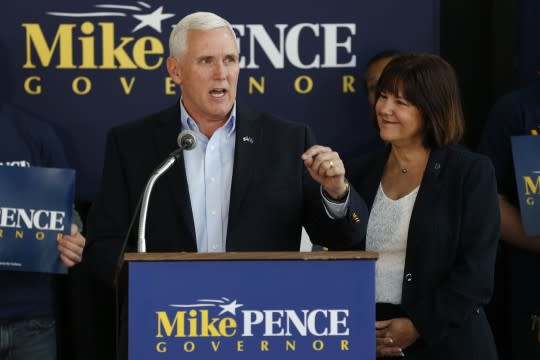
For one thing, certain members of Team Trump have taken to pushing Pence, internally, as an alternative to early VP frontrunners Christie (who has lots of baggage) and Newt Gingrich (who’s kind of a loose cannon). Kellyanne Conway, a longtime pollster for the Indiana governor, “began pitching Pence as a vice presidential pick to Trump’s team as soon as Ted Cruz withdrew from the race,” according to CNN. (Conway joined the Trump campaign as a senior adviser earlier this month.) Meanwhile, a Trump source recently told NBC News that campaign chairman Paul Manafort, who is running the veep search, may not be enthusiastic about Newt because he “cannot control a Gingrich, whereas he can control a Pence.”
Their arguments seemed to have worked — hence the holiday invite to New Jersey. And when two other late bloomers took themselves out of the running early last week — Tennessee Sen. Bob Corker and Iowa Sen. Joni Ernst, both of whom also met with Trump on or around Independence Day — Pence’s stock only rose further. In a certain sense, he’s the last (non-Newt, non-Christie) man standing.
As for Pence, the more interest Trump has shown in him, the more interested he’s become in the gig. After sparking national controversies by proposing a state-run, taxpayer-funded news service and signing a “religious freedom” bill that would have permitted discrimination against LGBT individuals, Pence isn’t especially popular in Indiana, and his reelection effort pits him against an opponent, Democrat John Gregg, whom he defeated by only 3 percentage points in 2012. It’s possible that Pence could lose the rematch — which may be why several sources who have spoken to him or been briefed on his meeting with Trump told CNN last week that “Pence would accept the vice presidential nomination if he’s asked.”
Odds: High.
In some ways, Trump and Pence are an odd couple. Pence is fluent in the language of movement conservatism; Trump isn’t even conservative. Pence is a devout evangelical Christian who has spent his entire career fighting in the culture wars; Trump, who once cited “Two Corinthians” 3:17 as a favorite Bible verse, is the most gay-friendly GOP nominee ever. Trump says whatever pops into his head at any given moment; Pence is known for his unflappable message discipline. Trump thinks that “campaigning” and “negative campaigning” are the same thing; Pence wrote more than two decades ago that “a campaign ought to demonstrate the basic human decency of the candidate” and has avoided political vitriol ever since. Et cetera.
Yet none of this has dissuaded Trump from vetting Pence. Nor has it dissuaded Pence from agreeing to be vetted. That’s likely because both men have realized that the very things that make Pence so unlike Trump may also make him Trump’s best remaining option for VP.
Pence isn’t a perfect pick. As Costa notes, “Working against Pence are questions in national political circles about whether he could successfully navigate the barrage of media attention and scrutiny that would come with being at Trump’s side, and whether he could successfully communicate his strident social conservatism to a fast-changing country.” Pence famously wilted under dogged questioning from ABC’s George Stephanopoulos about his support for Indiana’s “religious freedom” law.
At this point, however, Trump may not have anyone more suitable to turn to.
The last thing Trump needs, for instance, is another attack dog or ideological apostate on the ticket; he’s got both of those bases covered. Instead, with a convention revolt brewing and right-wing turnout threatening to plummet in November, a guy who can reassure conservatives on Trump’s behalf — both evangelical and otherwise — is probably going to prove more useful.
Then there’s geography to consider. Indiana voted for Barack Obama in 2008 and could conceivably swing back to Hillary Clinton; Pence could help Trump lock it down. At the same time, Pence’s boosters believe his influence could extend even further, citing Ohio, Michigan, Wisconsin, Iowa and Pennsylvania as possible pickups.
“When Hillary Clinton promised to put the coal industry out of work in West Virginia, her shocking comment reverberated westward, across at least six or seven states,” Kellyanne Conway recently told NBC News. “Pence could help [by] picking up one, two, three points right through the Midwestern states, where Romney bombed spectacularly.” (Coal mining remains a major part of southern Indiana’s economy.)
Finally, Trump has said again and again that he wants a partner who can help him “with legislation” and “getting things through” Washington — an established politician who has “been vetted over the last 20 years.” Pence fits the bill. Before running for governor in 2012, Pence served for 12 years in the House, ascending to the No. 4 spot in the GOP leadership.
“I’d be dancing in the aisles,” Rep. John Carter of Texas told the Hill on Sunday. “He’s one of the best we’ve ever had in Congress. I’d love to see Mike Pence be the guy. It’d be awesome.”
Now we just have to wait and see if Trump agrees. We should know by Friday.
_____
2. GOP platform committee retains tough language on transgender access to school bathrooms
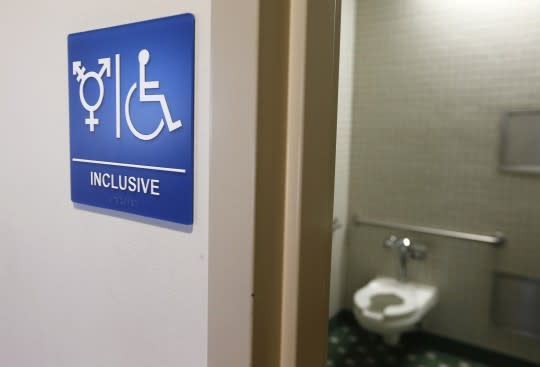
Republican delegates adopted tough language opposing the Obama administration’s policy on transgender school kids in a platform subcommittee hearing Monday morning.
Donald Trump has kept his distance from the transgender bathroom issue, saying in the spring that Caitlyn Jenner is welcome to use whichever bathroom she wants at his properties. The New York Times reported that Trump recently spoke with Jenner.
But Trump has also reportedly signaled that he’ll accept the GOP platform, which about a hundred delegates are amending Monday and Tuesday in several conference rooms in Cleveland ahead of next week’s full convention. (Read the full version of this story.)
Annie Dickerson, a delegate from New York and an adviser to GOP billionaire donor Paul Singer, urged her colleagues to strike language that condemns the Obama administration for telling schools to allow students to use the bathroom and locker room of their gender identity. (Singer has funded pro-gay-marriage efforts around the country.) The RNC draft platform says the guidance is “illegal and dangerous” and “alien to America’s history and traditions.”
Dickerson urged her colleagues not to get distracted by the issue, which she said would alienate LGBT Republicans and pull the convention into a contentious issue.
“Bathrooms takes us down a rabbit hole,” Dickerson said.
Connie Hunter, a delegate from Tennessee, said she personally disagreed with the Obama administration policy but thought it was “overkill” to include it in the platform. “I don’t think this is the place to open up that can of worms,” she said.
Dickerson added that the language “takes us to a place where our convention is about bathrooms.”
But the push failed. Tony Perkins, a delegate from Louisiana and the president of the socially conservative Family Research Council, said the party should include the position in order to support the 11 states that are suing the Obama administration over the policy.
“I believe it’s time for Republicans to take a stand on it,” said West Virginia delegate Melody Potter.
_____
3. In the arena
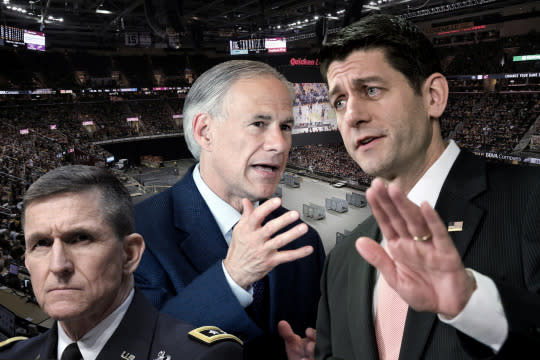
Our roundup of the big names making convention news today
Add another last-minute name to Donald Trump’s VP shortlist: retired Lt. Gen. Michael T. Flynn. On Friday, the New York Post reported that Flynn — a registered Democrat but fierce critic of President Obama after being forced out of his role as head of the Defense Intelligence Agency in 2014 — has submitted to a formal vetting by the Trump campaign; he previously served as an informal policy adviser to the candidate. According to the Washington Post, Trump has grown “slightly bored by the prospect of going with a traditional Republican” and is tempted by the “surprise and star power” of a Trump-Flynn ticket. One potential deal breaker: On Sunday Flynn told ABC that, when it comes to abortion, “I think women have to be able to choose.” Needless to say, that wouldn’t sit well with conservatives already suspicious of Trump.
In fact, some Republicans are already plotting to block an insufficiently conservative veep pick at the GOP convention in Cleveland next week. Colorado delegate Regina Thompson, executive director of the anti-Trump group Free the Delegates, is circulating a proposal to alter Rule 40, the party bylaw that guides how delegates nominate both the president and vice president. The nominee’s running mate is still technically decided by an independent delegate vote and delegates have no formal obligation to support the nominee’s choice. To make it more difficult for Trump’s pick to pass muster, the Rules Committee could (theoretically) say that two-thirds of the delegates need to vote for him or her on the first ballot. (Right now, a simple majority will do.) Thompson & Co. are also considering altering language that encourages delegates to ratify the nominee’s preferred candidate and passing an amendment that would allow three state delegations to band together and put forward an alternative VP (as opposed to the current eight-state requirement).
In 2008, GOP delegates made a similar threat, warning that they would reject Connecticut Sen. Joe Lieberman, then a Democrat, if nominee John McCain picked him for VP.
So far, Trump has had some trouble securing speakers for his convention. But on Thursday, according to a new Politico report, House Speaker — and regular Trump critic — Paul Ryan agreed to address the delegates. The speech will be 10 minutes long and will focus on “the sharp contrast between Republican ideas and four more years of Obama-like progressive policies; and the need for conservatives to unite around Republican candidates in advance of a critical election,” per an aide to the speaker.
Texas Gov. Greg Abbott may not be able to attend the Republican convention after suffering extensive second- and third-degree burns on both legs during a family vacation in Jackson Hole, Wyo. Abbott was accidentally scalded by hot water. He has used a wheelchair since an oak limb fell and crushed his spine at the age of 26.
Virginia GOP delegate Beau Correll, a lawyer by day, has filed a lawsuit claiming that he has the right to vote his conscience at the national convention despite a state law that requires him to vote for the winner of the Virginia presidential primary (who was Donald Trump). The courts have previously ruled that states don’t have the power to regulate internal party affairs, but a favorable decision in the Correll suit would provide a fresh precedent just in time for Cleveland. A decision is expected early this week.
_____
4. How Sanders transformed the Democratic platform — and why it matters
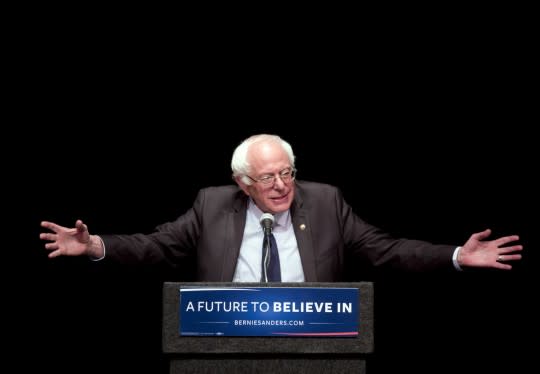
Every four years, political reporters dutifully write stories about the party platforms. And every four years those same reporters dutifully note that what they’re writing about isn’t, you know, important — a symbolic gesture, they might say, that ultimately doesn’t have any bearing on actual policy.
Or, as MSNBC’s Alex Seitz-Wald put it this past Sunday, ”Party platforms are unenforceable message documents that are generally ignored almost as quickly as they’re written.”
The only thing is, this year’s Democratic platform is important. Not because it will bind Hillary Clinton — whether she likes it or not — to a specific set of positions. It won’t. It can’t.
Instead, the 2016 Democratic platform is important precisely because it is symbolic.
By making policy the centerpiece of an unusual post-primary campaign — by openly contesting the drafting process for the first time since 1980 and refusing to concede until Democrats passed “the most progressive platform in the history of the party” — Vermont Sen. Bernie Sanders has simply transformed the platform into a different kind of symbol. Before it was symbol of the nominee’s values. Now it’s a symbol of the runner-up’s. And that, in turn, will make it a vehicle for bringing the party together — which seems to be what Sanders had in mind all along.
No, Sanders did not get everything he wanted when the Democratic Platform Committee met to finalize its language this past weekend in Orlando, Fla. His main objective was passing a plank that would put the party on record as opposing a congressional vote on President Obama’s Trans-Pacific Partnership trade deal. The proposal failed Saturday morning by a vote of 104 to 77 — after which “some Sanders supporters broke into boos and walked out of the meeting room while others shook their fists in a thumbs-down position.”
A Sanders-backed measure to “end the [Israeli] occupation” of Palestine fell short as well, as did one advocating for an international effort to rebuild the Gaza Strip. Sanders also lost a vote on an amendment calling for a ban on “revolving doors” between the government and the private sector.
But Sanders ultimately won more battles than he lost. At a series of Platform and Platform Drafting Committee meetings over the last few weeks — in Washington, D.C., in St. Louis, and finally in Orlando — Sanders steadily gained ground on his signature issues. He got his revived Glass-Steagall Act. He got his Social Security expansion. He got his death-penalty ban. He got his price on carbon. He got his pathway to legalized pot. And on Friday night, he even got the Clinton campaign to agree to a plank that calls for raising the minimum wage to $15 an hour — nationwide — and indexing it to inflation.
Hillary Clinton supported none of these ideas when she launched her campaign in 2015. Now (pending a vote by the entire convention in Philadelphia) her party supports all of them.
But the point is not just that this year’s Democratic platform is the most progressive in party history — which is a fact. It’s that Sanders himself is saying it is.
“We have made enormous strides,” Sanders announced in a statement Sunday. “Thanks to the millions of people across the country who got involved in the political process — many for the first time — we now have the most progressive platform in the history of the Democratic Party.”
In other words, “mission accomplished.” As much as any particular policy win, it is this validation — Sanders’ validation of the platform, and the platform’s validation of Sanders’ campaign — that gives the 2016 document its distinctive symbolic power. Why? Because it reassures his supporters that their voices were heard and that their passion had a purpose. It’s the permission that many of them need — Bernie included — to vote for Clinton this fall.
Or as Sanders himself put it in Sunday’s statement — and will likely put it again when he rallies alongside Clinton Tuesday morning in Portsmouth, N.H., where he is expected to endorse her — “The fight is just beginning. If we are going to transform America and create a government which works for all and not just the 1 percent we need to elect candidates who will fight for these principles. We need to elect a Democratic Congress and president and make certain that the language in the Democratic platform is translated into law.”
In the meantime, it’s never too early to start speculating about…
_____
5. What’s next for Sanders
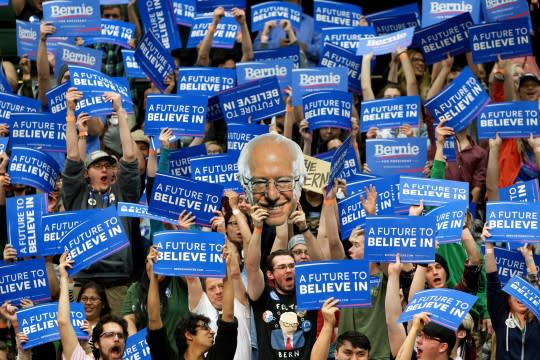
Yahoo News National Correspondent Hunter Walker reports that while Bernie Sanders has been pushing to make the Democratic platform as progressive as possible, his team has been “lay[ing] the groundwork for his next move.” For now, Sanders’ exact plan for exerting influence on the party remains somewhat unclear, and there are strategic disagreements among his allies. But a preliminary vision is beginning to take shape.
More from Walker:
A Democratic operative who has been involved in conversations with the Sanders campaign said there were talks about a post-campaign organization headed by Sanders. The operative requested anonymity in order to candidly provide details of these private deliberations about what the campaign’s “going forward structure should look like.” Though these conversations had taken place, the operative said firm plans had not been made as of late last month.
“From what I can gather, they haven’t yet made a decision,” the operative said of the Sanders campaign.
An organization along the lines of President Obama’s Organizing for Action would allow Sanders, a fundraising powerhouse, to tap into his donor and email lists. The operative said Sanders could use this group to back like-minded progressive candidates and build a power base in the Senate. It could also be used to support his policy agenda, including opposing the Trans-Pacific Partnership (TPP) trade deal and tax policy negotiations.
Yahoo News reached out to the Sanders campaign to discuss his future plans. His team arranged an interview with campaign manager Jeff Weaver before abruptly canceling.
Weaver, who has spent decades working with Sanders and is the senator’s closest aide, is playing a key role as the campaign determines how to move forward.
One vote in favor of an OFA-style group came earlier from Sanders’ wife Jane, who told Yahoo Chief National Correspondent Lisa Belkin in June that “this is something we will move on regardless of the outcome of this election, and I will definitely be involved in that.”
Her husband does not take his talk of a “revolution” lightly, [Jane] says, and win or lose he and his circle intend to use the clout from this campaign to keep pushing their ideas. That means marshaling the lists and infrastructure built during the past year into some sort of organized change.
“It’s not just about winning the presidency, it’s about changing our country to have it be what we all want it to be and know it can be,” she says. “As president, he’d want an outside, really organized group of people helping support him, moving it in the direction of the issues that he’s talked about. And if he’s not the nominee, it will be him leading that group, leading that transformation.”
She’s been spending some time noodling on the details of such a group — something like MoveOn or Organizing for Action, but with a Sanders-issues focus. “It’s something I’ve thought about and will be able to bring to him at a future moment, not in the middle of a campaign.”
Will Bernie and Jane launch their own version of OFA after the election? Should they? Drop us a line on Twitter (@andrewromano) and let us know what you think.
_____

6. The best of the rest
Anti-Trump Republicans will make their final stand this week https://t.co/VFAeJurs3l
— POLITICO (@politico) July 10, 2016
Kasich won’t support @realDonaldTrump – but he’ll still be front at center in Cleveland next week https://t.co/C2B1RU0Uoy
— Lois Romano (@loisromano) July 11, 2016
Baby scoop: Draft platform sounds like Trump on trade, drops same-sex marriage amendment push: https://t.co/3wuqTbP8Hh
— Tal Kopan (@TalKopan) July 11, 2016
Romney or Kasich should announce he’s “willing to compete for nomination after convention has disposed of Trump.” https://t.co/QiaIlZMgiJ
— Bill Kristol (@BillKristol) July 10, 2016
quick recap of tonight’s #freethedelegates call https://t.co/JurEglhj3M
— Rosie Gray (@RosieGray) July 11, 2016
A look back at political-convention style through the years: https://t.co/FPhRbusjIl pic.twitter.com/juqevwg2Zf
— New York Magazine (@NYMag) July 11, 2016
.@GovChristie builds his case for @realDonaldTrump’s VP—@MattFriedmanNJ reports https://t.co/yhQpdhxV00 pic.twitter.com/9zouvpuO2e
— POLITICO New Jersey (@politiconj) July 11, 2016
DNC won’t disclose full list of DNC convention sponsors until after the convention https://t.co/ygRYwjjS3J
— David Sirota (@davidsirota) July 11, 2016
_____
Countdown
For the latest data, make sure to check the Yahoo News delegate scorecard and primary calendar.


